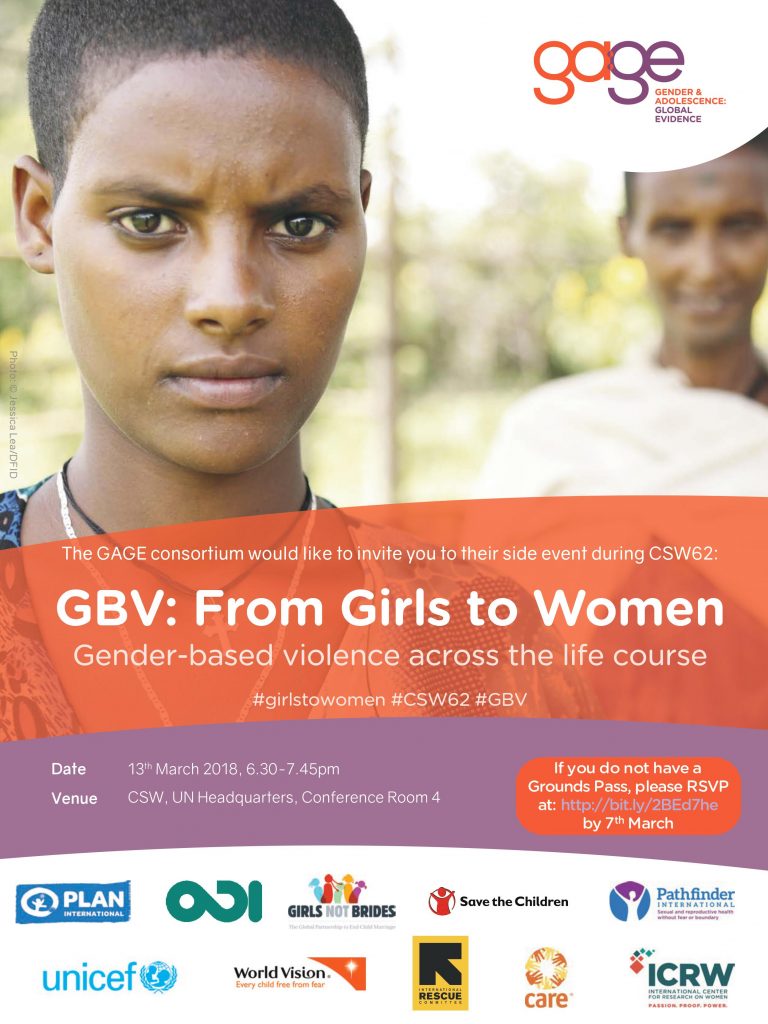Watch the event here.
Every 10 minutes, somewhere in the world, an adolescent girl dies as a result of violence. While violence in various forms is a risk and reality across the life course, the gendered profile of violence becomes even more pronounced as girls reach adolescence; yet a gap continues to exist between child protection initiatives and adult-focused GBV programming.
This event explored experiences of violence in childhood and adolescence, with a sharp focus on the impact of GBV on the development of adolescent girls in developing settings, humanitarian crises and protracted conflicts. Gender transformative approaches to better prevent and respond to violence at an early age and during adolescence were discussed, including initiatives to address practices based on gender inequality that perpetuate GBV, such as child marriage and FGM/C. The event also sought to amplify the voices of adolescents and connecting their experiences to policy and technical expertise, bridging the gap between violence against children and violence against women, improving multi-sector programmes to more effectively meet the unique needs of adolescent girls worldwide.
Questions
Violence in various forms is a risk and reality across the age spectrum. As girls and boys reach the second decade, the gendered profile of violence becomes even more pronounced. In this event we are focusing on the experience of gendered based violence during the second decade, and efforts to tackle it. These are some of the questions we explored:
The adolescent + gender lenses
What is the specific gender profile of adolescents’ experience of violence?
The role of gender norms
What is the role of gender norms and values in perpetuating violence and exploitation, especially as it relates to the links between violence against children, adolescents and women?
How do practices based on gender inequality, such as child marriage, perpetuate GBV? What is best practice in addressing these issues?
Programming
How can we better address the ‘gap’ that adolescent girls fall through, between childhood and adulthood—they experience adolescent girl-specific forms of violence including FGM/C and early marriage, yet most programs are tailored to either address very young children or adult women without an intentional focus on adolescent girls who fall in between.
How can programmes better prevent and respond to violence in the second decade and provide tailored solutions across that age spectrum?
Are there promising practices that offer an integrated approach across multiple sectors – including SRHR, education, health and justice?
What can CP programming learn from GBV interventions particularly around gender transformative approaches to preventing violence
Humanitarian and crisis settings
How do humanitarian crises and protracted conflicts affect the experience of gender-based violence and its effect on the second decade?
Speakers in Order of Appearance
- Ms. Cynthia McCaffrey – Director of the UNICEF Office of Global Innovation
- Ms. Inês Maria Gonçalves, WAGGS CSW delegate
- Ms. Xhorda, Albania (Girl Champion, Save the Children)
- Ms. Michelle Nunn, CEO Care USA
- Ms. Sophia Wanjiku Ngugi, Kenya (IRC)
- Ms. Beatrice Savadye, Zimbabwe (Roots, nominated by Girls Not Brides)
- Ms. Lois Quam, CEO Pathfinder International
- Mr. SM Shaikat, Bangladesh (SERAC, nominated by Girls Not Brides)
- Dr Nicola Jones, GAGE Director, Principal Research Fellow, Overseas Development Institute
- Chair: Professor Mary Ellsberg, Founding Director of the Global Women’s Institute at George Washington University
The event was hosted by GAGE Consortium partners, including Care, Girls Not Brides, ICRW, IRC, Pathfinder, Plan UK, Save the Children, UNICEF and World Vision, as well as ODI, and we estimate that over 400 people attended.
